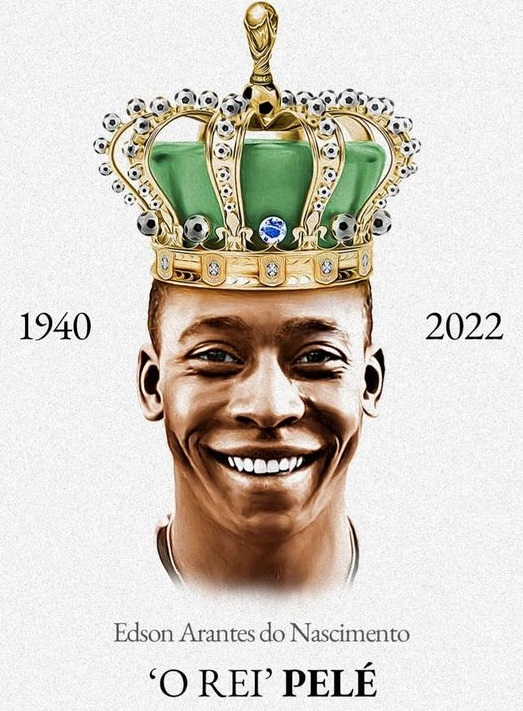The star Edson Arantes do Nascimento “Pelé” died at the age of 82 of colon cancer. He weaved a brilliant career in soccer, which with its own light, took him out of the dirt courts in his native Tres Coraçoes and took him to the heart of the soccer world.
“O Rei” -The King- is considered the best Sportsman of the 20th Century and perhaps one of the greatest of all time. So much so that in 1999 he was chosen by the International Olympic Committee (IOC), after a vote of all the National Olympic Committees, as the Sportsman of the Century. In December 2000, he was chosen by FIFA as the player of the Twentieth Century. On January 13, 2014, he received, in Zurich, Switzerland, the Special Golden Ball for his career.
Nickname Pelé and history.
On October 23, 1940, he was born in Tres Coraçoes, the first-born son of ex-footballer João Ramos do Nascimento, better known as “Dondinho” and Maria Celeste Arantes. As a child, Edson admired the goalkeeper Bilé, who played with his father in the Vasco de Sao Lorenço team. Because of his young age, he could not pronounce words well and did not pronounce the word “Bilé” correctly. He changed it to “Pelé,” so his friends and family began to call him Pelé. This name at first was not to his liking, but he learned to live with this nickname.
The story goes that on the fateful July 6, 1950, during the infamous “Maracanazo,” he saw his father crying bitterly over Brazil’s defeat in the World Cup final against Uruguay. At the age of nine, he promised that he would give the country its first World Cup title when he grew up.
In 1956 he was discovered in the children’s teams of the São Paulo club Baurú by former World Cup player Waldemar Brito, who convinced his father to try out for Santos, with whom he signed on August 6, 1956, at the age of 15. On September 7, 1956, he debuted and scored his first goal for Santos in a victory over the defunct Corinthians club of Santo André. The “victim,” goalkeeper Zaluar Torres Rodrigues, became known until his death, in 1995, for wearing jerseys with the inscription: “Goleiro Rei Pelé 0001” -Pele’s goal 0001-
On July 7, 1957, at 16, he debuted with the Brazilian national team in the final of the Copa Roca. Argentina won 1-2 in Rio de Janeiro. Pelé scored the partial equalizer after coming on in the second half. Then, on March 31, 1958, he was called up by coach Vicente Feola to play in the Sweden 58 World Cup. At 17, he became the youngest player to score a goal in a World Cup in Brazil’s 1-0 victory over Wales. Finally, on June 29, 1958, he won the promised World Cup title for his father at 9, scoring two goals in the final against Sweden (2-5).
On March 5, 1961, he scored what is considered the “most beautiful goal” ever recorded on camera against Fluminense. The goal was so beautiful that the opponents applauded it. To this day, a commemorative plaque is in his honor at the Maracana stadium.
Between May 30 and June 17, 1962, at the FIFA World Cup in Chile 1962, Pelé managed to take Brazil back to heaven by winning the World Cup for the second time. Then, on June 21, 1970, he was crowned three-time world champion and best player of the tournament at the Azteca stadium in Mexico City. Brazil beat Italy 4-1 and became the first player to win the World Cup three times and score in four World Cups.
In January 1975, he accepted a million-dollar offer from the New York Cosmos to return to play and become an ambassador of soccer in the United States. On May 15, 1975, he debuted with the Cosmos and scored a goal in a tie against the Dallas Tornadoes. In October 1977, he left the Cosmos in a friendly against Santos. Pelé plays halftime for each team, and the U.S. team beats the Brazilians 2-1, with a goal by Pelé.
Pelé’s most significant victory
Pelé’s most significant victory was overcoming racism. During his career, Edson Arantes do Nascimento gave a voice to the poor, to the blacks. However, discrimination against black players in the Brazilian national team was ruthless. To the extent that people of African descent were held responsible for the tragic Maracanazo of 1950 until Pelé changed everything. Although Pelé never liked to talk openly about racism. The so-called “best player of the century” was a source of inspiration for millions of people of color around the world. He never participated in the anti-racist struggle and was accused of little commitment to the black cause. But his immortal words came when he commented on the controversial racism against goalkeeper Aranha. “If I had to stop playing every time I was called a “monkey” or “criollo,” (In Brazil, the equivalent of the “N” word), they would have had to stop practically every game I played in. Nevertheless, I always kept going forward.”
Despite his achievements and influence in soccer, Pelé was also a victim of discrimination and racism throughout his career. Like baseball’s great Jackie Robinson, he suffered racism, insult, and denigration in silence. Never complained in public. Instead, he let his talent speak instead of his skin color.
Edson Arantes do Nascimiento changed soccer history. The color of his skin did not define his talent or his achievements. Instead of emphasizing his skin color, he is recognized and valued for what he was: an exceptional player, an icon of the sport, and one of the best soccer players in history. The one and only “O Rei do futebol ” -the king of football-… the great Pelé.
The Yucatan Times
Newsroom



